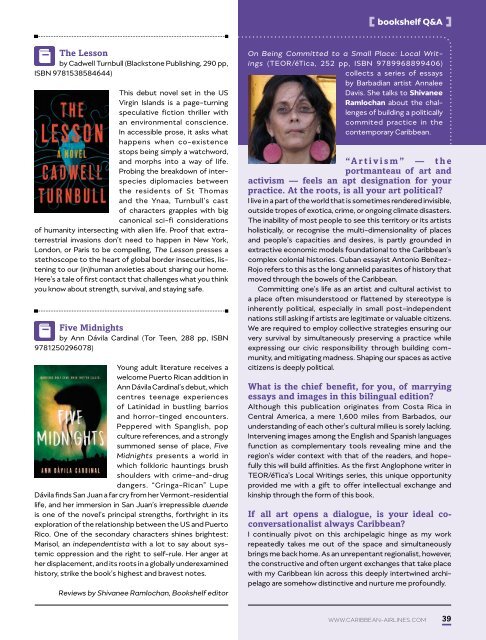Caribbean Beat — November/December 2019 (#160)
A calendar of events; music, film, and book reviews; travel features; people profiles, and much more.
A calendar of events; music, film, and book reviews; travel features; people profiles, and much more.
You also want an ePaper? Increase the reach of your titles
YUMPU automatically turns print PDFs into web optimized ePapers that Google loves.
ookshelf Q&A<br />
The Lesson<br />
by Cadwell Turnbull (Blackstone Publishing, 290 pp,<br />
ISBN 9781538584644)<br />
This debut novel set in the US<br />
Virgin Islands is a page-turning<br />
speculative fiction thriller with<br />
an environmental conscience.<br />
In accessible prose, it asks what<br />
happens when co-existence<br />
stops being simply a watchword,<br />
and morphs into a way of life.<br />
Probing the breakdown of interspecies<br />
diplomacies between<br />
the residents of St Thomas<br />
and the Ynaa, Turnbull’s cast<br />
of characters grapples with big<br />
canonical sci-fi considerations<br />
of humanity intersecting with alien life. Proof that extraterrestrial<br />
invasions don’t need to happen in New York,<br />
London, or Paris to be compelling, The Lesson presses a<br />
stethoscope to the heart of global border insecurities, listening<br />
to our (in)human anxieties about sharing our home.<br />
Here’s a tale of first contact that challenges what you think<br />
you know about strength, survival, and staying safe.<br />
Five Midnights<br />
by Ann Dávila Cardinal (Tor Teen, 288 pp, ISBN<br />
9781250296078)<br />
Young adult literature receives a<br />
welcome Puerto Rican addition in<br />
Ann Dávila Cardinal’s debut, which<br />
centres teenage experiences<br />
of Latinidad in bustling barrios<br />
and horror-tinged encounters.<br />
Peppered with Spanglish, pop<br />
culture references, and a strongly<br />
summoned sense of place, Five<br />
Midnights presents a world in<br />
which folkloric hauntings brush<br />
shoulders with crime-and-drug<br />
dangers. “Gringa-Rican” Lupe<br />
Dávila finds San Juan a far cry from her Vermont-residential<br />
life, and her immersion in San Juan’s irrepressible duende<br />
is one of the novel’s principal strengths, forthright in its<br />
exploration of the relationship between the US and Puerto<br />
Rico. One of the secondary characters shines brightest:<br />
Marisol, an independentista with a lot to say about systemic<br />
oppression and the right to self-rule. Her anger at<br />
her displacement, and its roots in a globally underexamined<br />
history, strike the book’s highest and bravest notes.<br />
Reviews by Shivanee Ramlochan, Bookshelf editor<br />
On Being Committed to a Small Place: Local Writings<br />
(TEOR/éTica, 252 pp, ISBN 9789968899406)<br />
collects a series of essays<br />
by Barbadian artist Annalee<br />
Davis. She talks to Shivanee<br />
Ramlochan about the challenges<br />
of building a politically<br />
commited practice in the<br />
contemporary <strong>Caribbean</strong>.<br />
“Artivism” <strong>—</strong> the<br />
portmanteau of art and<br />
activism <strong>—</strong> feels an apt designation for your<br />
practice. At the roots, is all your art political?<br />
I live in a part of the world that is sometimes rendered invisible,<br />
outside tropes of exotica, crime, or ongoing climate disasters.<br />
The inability of most people to see this territory or its artists<br />
holistically, or recognise the multi-dimensionality of places<br />
and people’s capacities and desires, is partly grounded in<br />
extractive economic models foundational to the <strong>Caribbean</strong>’s<br />
complex colonial histories. Cuban essayist Antonio Benítez-<br />
Rojo refers to this as the long annelid parasites of history that<br />
moved through the bowels of the <strong>Caribbean</strong>.<br />
Committing one’s life as an artist and cultural activist to<br />
a place often misunderstood or flattened by stereotype is<br />
inherently political, especially in small post-independent<br />
nations still asking if artists are legitimate or valuable citizens.<br />
We are required to employ collective strategies ensuring our<br />
very survival by simultaneously preserving a practice while<br />
expressing our civic responsibility through building community,<br />
and mitigating madness. Shaping our spaces as active<br />
citizens is deeply political.<br />
What is the chief benefit, for you, of marrying<br />
essays and images in this bilingual edition?<br />
Although this publication originates from Costa Rica in<br />
Central America, a mere 1,600 miles from Barbados, our<br />
understanding of each other’s cultural milieu is sorely lacking.<br />
Intervening images among the English and Spanish languages<br />
function as complementary tools revealing mine and the<br />
region’s wider context with that of the readers, and hopefully<br />
this will build affinities. As the first Anglophone writer in<br />
TEOR/éTica’s Local Writings series, this unique opportunity<br />
provided me with a gift to offer intellectual exchange and<br />
kinship through the form of this book.<br />
If all art opens a dialogue, is your ideal coconversationalist<br />
always <strong>Caribbean</strong>?<br />
I continually pivot on this archipelagic hinge as my work<br />
repeatedly takes me out of the space and simultaneously<br />
brings me back home. As an unrepentant regionalist, however,<br />
the constructive and often urgent exchanges that take place<br />
with my <strong>Caribbean</strong> kin across this deeply intertwined archipelago<br />
are somehow distinctive and nurture me profoundly.<br />
WWW.CARIBBEAN-AIRLINES.COM<br />
39

















